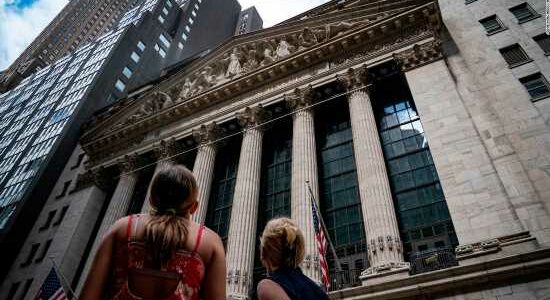
Recession is likely coming. How bad will it be?
New York (CNN Business)The Wall Street gambling parlor is still alive and well.
Asset management firm AXS Investments recently launched funds that let investors make supersized bets on — or against — the daily performance of individual stocks.
AXS now offers ETFs that use leverage, namely through exotic instruments known as derivatives contracts, to let traders get either a boosted long (bullish) or short (bearish) position on PayPal (PYPL), Pfizer (PFE) and Nike (NKE). There are also two ETFs that offer only super short positions on Tesla (TSLA) and Nvidia (NVDA).
Bet correctly, investors could turn small bets into big gains. That’s because the long ETFs should go up even more than the actual stock does on good days while the short ETFs are designed to fall further.
On Monday, for example, when shares of Pfizer rose 1.1%, the bullish Pfizer ETF gained 2.4% and the bearish ETF for the drug maker fell 2.3%.
Greg Bassuk, the CEO of AXS, said in a press release about the ETF launches that the funds will let investors “express their high-conviction views on some of the most actively traded single stocks, regardless of whether their sentiment is bullish or bearish.”
But make no mistake. This is a highly risky strategy geared toward many of the short-term traders in the Reddit WSB crowd and is just another example of the casino-like atmosphere in the market.
Bad long or short bets could fare substantially worse than a typical losing purchase of a stock.
To its credit, AXS clearly states on its website that the ETFs “are intended to be used as short-term vehicles.” AXS also has a lot of cautionary language in its press release, pointing out that they “are not appropriate for investors who do not intend to actively monitor and manage their portfolios.”
AXS goes on to say that “for periods longer than a single day, the funds will lose money if the underlying stock’s performance is flat,” and “an investor could lose the full principal value of his/her investment within a single day.” AXS added that the ETFs don’t provide “the benefits of diversification” and “pose risks that are unique and complex.”
ETFs betting on one stock are not for the faint of heart
That’s why any investor that is considering taking a gamble on any of these ETFs has to be very, very careful.
“These products could be risky for those investors who hold them for long periods without understanding the mechanics of daily rebalancing,” said Aniket Ullal, vice president of ETF data and analytics at CFRA Research, in a report. “Investor education around these products will be critical as they are introduced into the market.”
The Securities and Exchange Commission approved the ETFs but two regulators are still nervous about them.
“I worry that these single-stock ETFs pose yet another, perhaps greater, risk for investors and the markets,” said SEC commissioner Caroline Crenshaw, in a press release.
“Investors’ returns over a longer period of time might be significantly lower than they would expect based on the performance of the underlying stock. These effects are likely to be especially pronounced in volatile markets,” she added.
And Lori Schock, the SEC’s director of investor education, said in her own statement that “though these products will be listed and traded on an exchange, they are not right for every investor.”
Investors increasingly have looked to diversify their holdings with ETFs that mimic the performance of popular indexes like the S&P 500 and Nasdaq 100.
These index ETFs, as well as more niche sector and thematic ETFs, tend to own a broader mix of companies. So they are inherently less risky than an individual stock, let alone a fund that is making a leveraged bet on just one company. That’s why investors need to be wary of single-stock ETFs.
“Familiarity with these stocks or a successful track record while holding them may discourage investors from diversifying,” said Bryan Ting, a researcher with Dimension Fund Advisors, and Wes Crill, the firm’s head of investment strategists, in a recent blog post.
“This can lead to one of the most well-known cautionary tales in finance: tragic declines in wealth from losses in single securities. Data on the behavior of individual stocks suggests it’s hardly rare for firms to underperform — or even go under,” they said, noting that only a fifth of stocks survive and outperform the market over 20-year periods.
Source: Read Full Article


